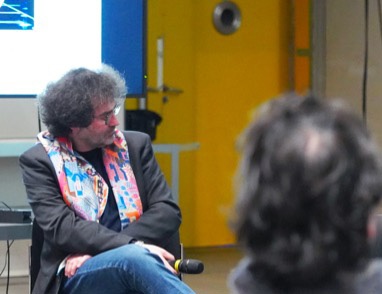Carmine Emanuele Cella, nouveau directeur de la Recherche musicale à l'Ircam
Carmine, votre parcours est marqué par une double formation, en musique et en mathématiques appliquées, et un double métier, de compositeur et de chercheur en mathématiques.
J’ai en effet étudié le piano, la composition et l’informatique musicale au Conservatoire G. Rossini de Pesaro, en Italie, avant d’obtenir un doctorat en composition à l’Accademia Nazionale di Santa Cecilia à Rome. Parallèlement, j’ai poursuivi des études en philosophie et en mathématiques, jusqu’à soutenir en 2011 une thèse de doctorat en logique mathématique appliquée à l’Université de Bologne, intitulée On Symbolic Representations of Music. Musique et mathématiques allaient donc déjà main dans la main.
En 2007, j’ai entamé une collaboration au long cours avec l’Ircam à Paris, en tant que chercheur et compositeur. Cette expérience m’a permis d’explorer les relations entre ces deux disciplines, en me concentrant sur l’analyse et la synthèse du son. Mon travail à l’Ircam a été une étape clé dans le développement de ma recherche sur les représentations symboliques de la musique et les modèles mathématiques du son.
Quelle est votre mission en tant que directeur de la recherche artistique ?
 Cela consiste à renforcer la nature hybride unique de l’Ircam, située à l’intersection de l’art et de la science, afin de favoriser l’émergence de créations innovantes et visionnaires qui seraient inaccessibles dans le cadre d’autres institutions.
Cela consiste à renforcer la nature hybride unique de l’Ircam, située à l’intersection de l’art et de la science, afin de favoriser l’émergence de créations innovantes et visionnaires qui seraient inaccessibles dans le cadre d’autres institutions.
L’Ircam occupe une place singulière dans le paysage de la création contemporaine : c’est un laboratoire où la recherche scientifique rencontre l’expérimentation artistique, où les compositeurs et compositrices, interprètes, ingénieur.e.s, chercheurs et chercheuses, collaborent pour explorer de nouvelles dimensions du son et de la musique. Cette dualité art/science ne se limite pas à un simple dialogue entre disciplines ; elle constitue un véritable terrain de transformation où les découvertes théoriques nourrissent directement la pratique artistique et où les besoins des artistes inspirent de nouvelles avancées technologiques. Je m’efforce de créer un environnement où compositeurs, compositrices, chercheurs et chercheuses peuvent collaborer pour explorer de nouvelles formes d’expression musicale, en tirant parti des outils numériques et des modèles mathématiques avancés.
Quels sont selon vous les enjeux de la recherche artistique et comment comptez-vous les aborder ?
L’un des principaux enjeux de la recherche artistique aujourd’hui est de redonner à la musique son rôle expérimental et prospectif. Trop souvent, l’innovation technologique est perçue comme une finalité en soi, alors qu’elle devrait être un moyen d’explorer de nouvelles possibilités expressives. Il est essentiel de développer des outils qui respectent la sensibilité artistique tout en offrant de nouvelles possibilités créatives. Cette approche nécessite une collaboration étroite entre les artistes, les développeurs et développeuses de nouvelles technologies et le public, afin de redéfinir la manière dont nous percevons et vivons la musique.
Cela suppose aussi de repenser la manière dont nous faisons de la musique aujourd’hui : comment la technologie peut-elle être utilisée pour enrichir le langage musical ? Quels nouveaux modèles de performance pouvons-nous imaginer ? Comment redéfinir la place du public dans l’expérience musicale ? Il sera également essentiel, dans nos futurs projets, d’aborder des questions importantes autour des enjeux de parité, d’égalité et d’équité, afin de construire ensemble un espace toujours plus ouvert et inclusif.
Propos recueillis par Jérémie Szpirglas


